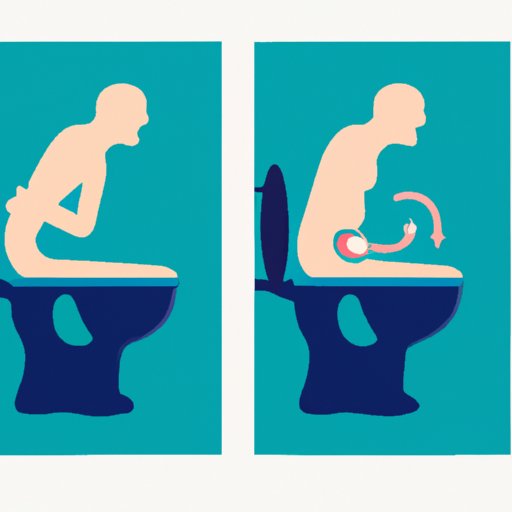
Introduction
Have you been making frequent trips to the bathroom lately? If so, you may be experiencing a condition called frequent urination. Frequent urination is the need to urinate more often than usual, and it can occur both day and night. This condition can be frustrating, uncomfortable, and even embarrassing. However, there are several natural remedies, lifestyle changes, and medical interventions that can help alleviate the symptoms of frequent urination.
The importance of addressing frequent urination cannot be overstated. Frequent urination may be a symptom of an underlying medical condition, such as diabetes or an overactive bladder. It can also affect your quality of life by interfering with sleep, work, and daily activities. Seeking treatment for frequent urination is essential to restore your sense of control and improve your overall well-being.
Natural Remedies
Several natural remedies can help reduce the symptoms of frequent urination, including:
Drinking fewer caffeinated beverages
Caffeine is a diuretic, which means it can increase urine production and cause the need to urinate more frequently. Limiting your intake of caffeinated beverages like coffee, tea, and soda can help reduce your symptoms. If you can’t entirely cut out caffeine, consider switching to decaf versions of your favorite drinks.
Reducing stress
Stress can worsen the symptoms of frequent urination, so it’s essential to practice stress-reducing activities like yoga, meditation, or deep breathing exercises. Finding healthy ways to manage stress can help improve your overall well-being and reduce the need to urinate frequently.
Drinking plenty of water
Drinking plenty of water may seem counterintuitive, but it can help reduce the symptoms of frequent urination. Staying hydrated can improve bladder function and reduce the need to urinate frequently. Drinking water can also help flush out any irritants or bacteria that may be causing your bladder to be overactive.
Lifestyle Changes
Several lifestyle changes can help reduce the symptoms of frequent urination, including:
Losing weight
If you’re carrying extra weight, losing weight can help reduce the pressure on your bladder and improve bladder function. Losing weight can also help reduce the risk of developing conditions like incontinence, which can contribute to frequent urination.
Stopping smoking
Smoking can irritate the bladder and make you more prone to developing bladder problems. Quitting smoking can help improve your bladder function and reduce your risk of developing bladder cancer.
Limiting alcohol intake
Like caffeine, alcohol is a diuretic and can increase urine production. Limiting your alcohol intake can help reduce the symptoms of frequent urination.
Medical Interventions
If natural remedies and lifestyle changes don’t improve your symptoms, several medical interventions can help, including:
Medications
Several medications can help reduce the symptoms of frequent urination. Your doctor may prescribe anticholinergic drugs, which help calm an overactive bladder. Other medications, like desmopressin, can help reduce urine production at night, which can improve your sleep and reduce your symptoms.
Surgery
If your symptoms are severe and other treatments aren’t effective, your doctor may recommend surgery. Surgeries like bladder suspension or bladder augmentation can help reduce the symptoms of frequent urination.
Bladder training therapy
Bladder training therapy involves retraining your bladder to hold urine for longer periods. Your doctor may recommend timed voiding, which involves setting scheduled times for urination, or urge suppression, which involves delaying urination urges until they become more manageable.
Bladder Training Tips
Bladder training therapy can be challenging, but several tips can help you get the hang of it, including:
Delaying urination urges
When you feel the urge to urinate, try to hold it for a few extra minutes. Gradually increase the time you hold your urine until you can make it to the bathroom comfortably.
Adopting a routine
Set scheduled times for urinating, even if you don’t feel the urge. This can help retrain your bladder and reduce the need to urinate frequently.
Gradually increasing urinary intervals
Gradually increase the time between urinating sessions. If you usually go every hour, try to hold it for an hour and ten minutes. Continue increasing the intervals as your bladder becomes more accustomed to holding more urine.
Strengthening Pelvic Floor Muscles
Strengthening your pelvic floor muscles can help improve bladder control and reduce the need to urinate frequently. The pelvic floor muscles support the bladder, rectum, and other organs, and weak muscles can contribute to bladder problems. Kegel exercises, which involve contracting and relaxing the pelvic floor muscles, can help build strength and improve bladder function.
Foods to Avoid
Certain foods and drinks can irritate the bladder and worsen the symptoms of frequent urination. Avoiding these foods and drinks can help reduce your symptoms, including:
Alcohol
Alcohol can irritate the bladder and increase urine production, so it’s best to limit your intake.
Caffeine
Caffeine is a diuretic and can increase urine production. Limiting your intake of coffee, tea, soda, and other caffeinated beverages can help reduce your symptoms.
Spicy Foods
Spicy foods can irritate the bladder and increase urinary urgency. Avoiding spicy foods can help reduce your symptoms.
Citrus Fruits
Citrus fruits like oranges and grapefruits can irritate the bladder and cause urinary urgency. Limiting your intake of these fruits can help reduce your symptoms.
Conclusion
Frequent urination is a common but frustrating condition that can interfere with your daily activities and well-being. Fortunately, there are several natural remedies, lifestyle changes, and medical interventions available to help reduce your symptoms. If you’re experiencing frequent urination, consider implementing some of the tips and strategies outlined in this article. And if your symptoms persist, don’t hesitate to seek medical advice. With proper treatment, you can alleviate your symptoms and improve your quality of life.




